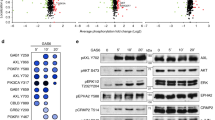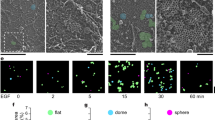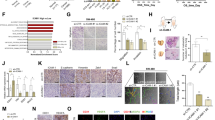Abstract
Progression of human colon cancer is often associated with elevated expression and activity of the Src family tyrosine kinase (SFK). SFK is ordinarily in equilibrium between inactive and primed states by a balance of negative regulatory kinase Csk and its counteracting tyrosine phosphatase(s), both of which act on the regulatory C-terminal tyrosine of SFK. To evaluate the contribution of the regulatory system of SFK in cancer progression, we here modulated the equilibrium status of SFK by introducing wild-type or dominant-negative Csk in human epithelial colon cancer cells, HCT15 and HT29. Overexpression of wild-type Csk induced decreased SFK activation, increased cell–cell contacts mediated by E-cadherin, decreased the number of focal contacts and decreased cell adhesion/migration and in vitro invasiveness. Conversely, expression of a dominant-negative Csk resulted in elevated SFK activation, enhanced phosphorylation of FAK and paxilllin, enhanced cell scattering, an increased number of focal contacts, dramatic rearrangement of actin cytoskeleton and increased cell adhesion/migration and in vitro invasiveness. In these scattered cells, however, localization, expression and phosphorylation of either E-cadherin or β-catenin were not significantly affected, suggesting that the E-cadherin-mediated cell–cell contact is indirectly regulated by SFK. Furthermore, all these events occurred absolutely dependent on integrin-mediated cell adhesion. These findings demonstrate that Csk defines the ability of integrin-SFK-mediated cell adhesion signaling that influences the metastatic potential of cancer cells.
This is a preview of subscription content, access via your institution
Access options
Subscribe to this journal
Receive 50 print issues and online access
$259.00 per year
only $5.18 per issue
Buy this article
- Purchase on Springer Link
- Instant access to full article PDF
Prices may be subject to local taxes which are calculated during checkout





Similar content being viewed by others
References
Aberle H, Bauer A, Stappert J, Kispert A and Kemler R . (1997). EMBO J., 16, 3797–3804.
Avizienyte E, Wyke AW, Jones RJ, McLean GW, Westhoff MA, Brunton VG and Frame MC . (2002). Nat. Cell Biol., 4, 632–638.
Boardman LA and Karnes Jr WE . (1995). Gastroenterology, 108, 291–294.
Bolen JB, Veillette A, Schwartz AM, DeSeau V and Rosen N . (1987). Proc. Natl. Acad. Sci. USA, 84, 2251–2255.
Cartwright CA, Coad CA and Egbert BM . (1994). J. Clin. Invest., 93, 509–515.
Cartwright CA, Kamps MP, Meisler AI, Pipas JM and Eckhart W . (1989). J. Clin. Invest., 83, 2025–2033.
Cary LA, Klinghoffer RA, Sachsenmaier C and Cooper JA . (2002). Mol. Cell. Biol., 22, 2427–2440.
Daigo Y, Furukawa Y, Kawasoe T, Ishiguro H, Fujita M, Sugai S, Nakamori S, Liefers GJ, Tollenaar RA, van de Velde CJ and Nakamura Y . (1999). Cancer Res., 59, 4222–4224.
Dan S, Tsunoda T, Kitahara O, Yanagawa R, Zembutsu H, Katagiri T, Yamazaki K, Nakamura Y and Yamori T . (2002). Cancer Res., 62, 1139–1147.
Frame MC . (2002). Biochim. Biophys. Acta, 1602, 114–130.
Fujita Y, Krause G, Scheffner M, Zechner D, Leddy HE, Behrens J, Sommer T and Birchmeier W . (2002). Nat. Cell Biol., 4, 222–231.
Hauck CR, Hsia DA and Schlaepfer DD . (2002). IUBMB Life, 53, 115–119.
Hyafil F, Morello D, Babinet C and Jacob F . (1980). Cell, 21, 927–934.
Imamoto A and Soriano P . (1993). Cell, 73, 1117–1124.
Irby RB, Mao W, Coppola D, Kang J, Loubeau JM, Trudeau W, Karl R, Fujita DJ, Jove R and Yeatman TJ . (1999). Nat. Genet., 21, 187–190.
Irby RB and Yeatman TJ . (2002). Cancer Res., 62, 2669–2674.
Kobayashi M, Nagata S, Iwasaki T, Yanagihara K, Saitoh I, Karouji Y, Ihara S and Fukui Y . (1999). Proc. Natl. Acad. Sci. USA, 96, 4874–4879.
Laghi L, Bianchi P, Orbetegli O, Gennari L, Roncalli M and Malesci A . (2001). Br. J. Cancer, 84, 196–198.
Nada S, Okada M, MacAuley A, Cooper JA and Nakagawa H . (1991). Nature, 351, 69–72.
Nada S, Yagi T, Takeda H, Tokunaga T, Nakagawa H, Ikawa Y, Okada M and Aizawa S . (1993). Cell, 73, 1125–1135.
Nakagawa T, Tanaka S, Suzuki H, Takayanagi H, Miyazaki T, Nakamura K and Tsuruo T . (2000). Int. J. Cancer, 88, 384–391.
Nam JS, Ino Y, Sakamoto M and Hirohashi S . (2002). Clin. Cancer Res., 8, 2430–2436.
Nilbert M and Fernebro E . (2000). Cancer Genet. Cytogenet., 121, 94–95.
Ogawa A, Takayama Y, Sakai H, Chong KT, Takeuchi S, Nakagawa A, Nada S, Okada M and Tsukihara T . (2002). J. Biol. Chem., 277, 14351–14354.
Okada M and Nakagawa H . (1989). J. Biol. Chem., 264, 20886–20893.
Okada M, Nada S, Yamanashi Y, Yamamoto T and Nakagawa H . (1991). J. Biol. Chem., 266, 24249–24252.
Rengifo-Cam W, Masaki T, Shiratori Y, Kato N, Ikenoue T, Okamoto M, Igarashi K, Sano T and Omata M . (2001). Cancer, 92, 61–70.
Rosen N, Bolen JB, Schwartz AM, Cohen P, DeSeau V and Israel MA . (1986). J. Biol. Chem., 261, 13754–13759.
Sabe H, Knudsen B, Okada M, Nada S, Nakagawa H and Hanafusa H . (1992a). Proc. Natl. Acad. Sci. USA, 89, 2190–2194.
Sabe H, Okada M, Nakagawa H and Hanafusa H . (1992b). Mol. Cell. Biol., 12, 4706–4713.
Suen PW, Ilic D, Caveggion E, Berton G, Damsky CH and Lowell CA . (1999). J. Cell Sci., 112, 4067–4078.
Takayama Y, Tanaka S, Nagai K and Okada M . (1999). J. Biol. Chem., 274, 2291–2297.
Talamonti MS, Roh MS, Curley SA and Gallick GE . (1993). J. Clin. Invest., 91, 53–60.
Thomas SM and Brugge JS . (1997). Annu. Rev. Cell Dev. Biol., 13, 513–609.
Veillette A, Foss FM, Sausville EA, Bolen JB and Rosen N . (1987). Oncogene Res., 1, 357–374.
Wang NM, Yeh KT, Tsai CH, Chen SJ and Chang JG . (2000). Cancer Lett., 150, 201–204.
Acknowledgements
We thank Wouter Hazenbos for helpful discussions. This work was supported by the Research Foundation of Japan Society for the Promotion of Science and by a grant-in-aid for Scientific Research of Priority Areas, Cancer, from Ministry of Education, Culture, Sports, Science and Technology. WR-C was supported by a fellowship from the Japanese Society for the Promotion of Science.
Author information
Authors and Affiliations
Corresponding author
Rights and permissions
About this article
Cite this article
Rengifo-Cam, W., Konishi, A., Morishita, N. et al. Csk defines the ability of integrin-mediated cell adhesion and migration in human colon cancer cells: implication for a potential role in cancer metastasis. Oncogene 23, 289–297 (2004). https://doi.org/10.1038/sj.onc.1207041
Received:
Revised:
Accepted:
Published:
Issue Date:
DOI: https://doi.org/10.1038/sj.onc.1207041
Keywords
This article is cited by
-
Rack1 promotes epithelial cell–cell adhesion by regulating E-cadherin endocytosis
Oncogene (2012)
-
The NMDA Receptor NR1 Subunit is Critically Involved in the Regulation of NMDA Receptor Activity by C-terminal Src kinase (Csk)
Neurochemical Research (2011)
-
Src activity alters α3 integrin expression in colon tumor cells
Clinical & Experimental Metastasis (2009)
-
C-terminal Src kinase controls development and maintenance of mouse squamous epithelia
The EMBO Journal (2007)



